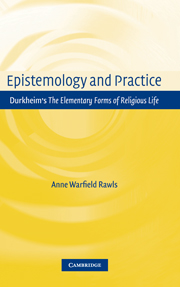Book contents
- Frontmatter
- Contents
- Acknowledgments
- Introduction
- 1 Durkheim's Outline of the Argument in the Introductory Chapter
- 2 Durkheim's Dualism: an Anti-Kantian, Anti-Rationalist Position
- 3 Sacred and Profane: the First Classification
- 4 Totemism and the Problem of Individualism
- 5 The Origin of Moral Force
- 6 The Primacy of Rites in the Origin of Causality
- 7 Imitative Rites and the Category of Causality
- 8 The Category of Causality
- 9 Logic, Language and Science
- 10 Durkheim's Conclusion Section iv: Logical Argument for Social Origin of the Categories
- Conclusion
- Bibliography
- Index
8 - The Category of Causality
Published online by Cambridge University Press: 22 September 2009
- Frontmatter
- Contents
- Acknowledgments
- Introduction
- 1 Durkheim's Outline of the Argument in the Introductory Chapter
- 2 Durkheim's Dualism: an Anti-Kantian, Anti-Rationalist Position
- 3 Sacred and Profane: the First Classification
- 4 Totemism and the Problem of Individualism
- 5 The Origin of Moral Force
- 6 The Primacy of Rites in the Origin of Causality
- 7 Imitative Rites and the Category of Causality
- 8 The Category of Causality
- 9 Logic, Language and Science
- 10 Durkheim's Conclusion Section iv: Logical Argument for Social Origin of the Categories
- Conclusion
- Bibliography
- Index
Summary
While Durkheim has discussed creation as an inherent property of certain rites in the first few chapters of Book III, his argument for the social origin of the category of causality does not begin until Book III, Chapter Three, Sections iii and iv. Because of the centrality of the concept of causality to epistemology, Durkheim's argument for the social origin of the concept of causality is the centerpiece of The Elementary Forms. The earlier sections of the book, particularly the extensive sections on totems and moral force, lay the groundwork for Durkheim's argument with regard to the category of causality. Causality is an essential concept in philosophy and played a pivotal role in the debate between empiricism and apriorism. Philosophers on both sides of the debate agreed that without causality, science would have no foundation. Indeed, knowledge itself, which Hume argued consists of inferences from effects to causes, would be impossible without the concept of causality.
Following the formulation of the problem by Hume and Kant, philosophers in Durkheim's day adopted several strategies toward explaining the origin of the idea of causality. Some agreed with Kant that the idea of causality was innate. Others argued that it was only an instinct, or as Hume had argued, an opinion. These arguments left the idea of causality without any empirical validity.
- Type
- Chapter
- Information
- Epistemology and PracticeDurkheim's The Elementary Forms of Religious Life, pp. 230 - 261Publisher: Cambridge University PressPrint publication year: 2005



